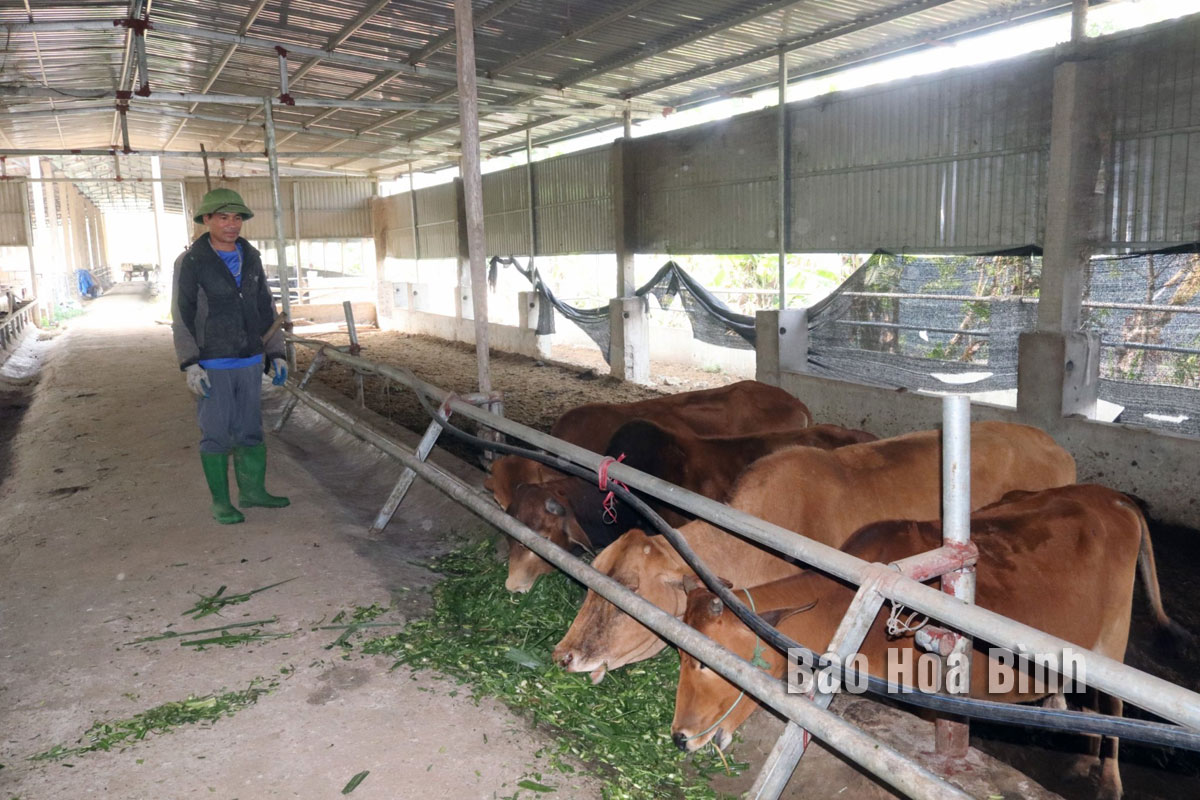
Residing in Dong Chum commune’s Na Loc hamlet, Luong Van Suong stands out as the proprietor of the largest cattle farm in Da Bac district. The achievement is a testament to the Tay ethnic farmer’s astuteness, dynamism, relentless learning and hard work.

Suong's cattle farm in
Dong Chum, Da Bac, generates significant employment opportunities for local
labourers.
After years of working across various provinces and cities,
Suong made the bold decision to return to the home village to embark on his own
entrepreneurial journey. Starting with just one cow, he gradually expanded his
venture. In 2012, he boldly borrowed capital to purchase six breeding cows,
adopting a free-range, fattening raising method. Additionally, he converted his
family's cornfield into a pasture, where he grew elephant grass as fodder for
the cattle.
In the initial phase of his startup journey, the farmer
encountered various challenges, including harsh weather conditions and animal
diseases. Undeterred, he actively visited successful farms and applied the
lessons learned to his own farm. Recognising the high economic value and
developmental potential of cattle farming in his locality, Suong continued to
secure bank loans and collaborated with friends and relatives to expand the
scale of his cow breeding operation.
Thanks to effective farming practices, disease prevention
measures, and stable herd development, the man currently maintains a herd of
over 100 cows, earning an annual income ranging from 250 to 300 million VND
(10,303 – 12,363 USD).
Suong said: "Having risen from poverty, I understand
the economic challenges facing my community. Relying solely on income from
crops like corn and rice helps them make ends meet, but is not enough to get
rich.” Therefore, he introduced a cattle farming model within the commune.
Families facing financial difficulties receive two mother cows from his farm
each for breeding. Once these cows give birth, the profits are evenly shared
between the two parties. The households continue to raise the mother cows until
they achieve economic stability.
Moreover, Suong's farm provides regular employment for three
workers with monthly wages ranging from 5 to 7 million VND and helps generate
incomes for dozens of seasonal labourers in the locality.
Widely
regarded as an exemplary figure of the local entrepreneurial movement, Suong
has significantly contributed to his hometown’s poverty reduction, rural development,
and socio-economic progress.
According to data from the Hoa Binh Provincial Party Committee, the industrial production index for the first six months of 2025 is estimated to have increased by 20% compared to the same period last year. This marks the highest year-on-year growth rate for this period since 2020.
In the first six months of 2025, Hoa Binh province’s export turnover was estimated at 1.145 billion USD, marking an 18.11% increase compared to the same period in 2024. Import turnover was estimated at $ 804 million, a 17.15% increase, which helped the province maintain a positive trade balance.
The lives of the ethnic minority farmers in Tan Lac district have gradually improved thanks to the new directions in agricultural production. This is a testament to the collective strength fostered through the professional associations and groups implemented by various levels of the district’s Farmers’ Union.
With the motto the "product quality comes first,” after nearly one year of establishment and operation, Muong village’s Clean Food Agricultural and Commercial Cooperative, located in Cau Hamlet, Hung Son Commune (Kim Boi district), has launched reputable, high-quality agricultural products to the market that are well-received by consumers. The products such as Muong village’s pork sausage, salt-cured chicken, and salt-cured pork hocks have gradually carved out a place in the market and they are on the path to obtaining the OCOP certification.
In the past, the phrase "bumper harvest, rock-bottom prices" was a familiar refrain for Vietnamese farmers engaged in fragmented, small-scale agriculture. But today, a new spirit is emerging across rural areas of Hoa Binh province - one of collaboration, organisation, and collective economic models that provide a stable foundation for production.
Maintaining growing area codes and packing facility codes in accordance with regulations is a mandatory requirement for agricultural products to be eligible for export. Recently, the Department of Agriculture and Environment of Hoa Binh province has intensified technical supervision of designated farming areas and packing facilities to safeguard the "green passport" that enables its products to access international markets.



